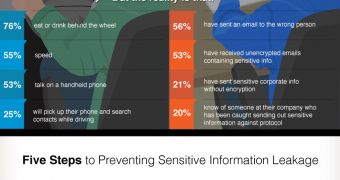A new study by SilverSky shows that most US employees are overly confident in their security habits. This, combined with the lack of email security tools, can ultimately lead to legal, regulatory and reputational risks through data loss.
The study shows that 98% of the respondents believe their email security habits are equal or better than the ones of their colleagues.
While many employees boast about being much more security conscious than their co-workers, and while many indicate that they go above company prescribed procedures to protect business communications, over half admit accidentally sending an email to the wrong person.
53% of the respondents admit receiving unencrypted sensitive data over email, but only 17% admit sending out such communications themselves.
As far as email security tools are concerned, only 32% of organizations use an email data loss prevention solution, and only 21% use an email encryption solution. 46% of those who took part in the survey acknowledged that email security could be improved within their company.
“How many times have you been slapped with a speeding ticket in the past year? Now think about how many times you’ve driven over the speed limit in the same time period – my guess is for most of us, that number is significantly higher,” commented Andrew Jaquith, chief technology officer and SVP of Cloud Strategy at SilverSky.
“The new SilverSky study draws many parallels between email security habits and driving habits. The vast majority of drivers perceive themselves to be attentive, safe operators, but in reality, most speed, eat and talk or text while behind the wheel,” Jaquith added.
“Likewise, many employees consider their email security behaviors to be superior to those of their colleagues. However, this hubris is likely to lead to careless behavior that could have serious consequences for the organization.”
The complete report is available here. You can also check out the infographic (see screenshot) that sums up the report.

 14 DAY TRIAL //
14 DAY TRIAL //